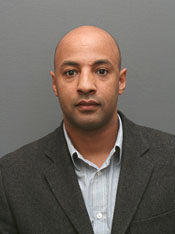Mosa Sayed examines informal administration of justiceegal
As Doctor of private international law, Mosa Sayed researches in the field of “Law and Conflicting Values” and has focused on the legal challenges facing Sweden after its transformation in recent decades to an increasingly multireligious and multicultural society.
This transformation has brought untested questions and tensions at the judicial level, not least for the courts and authorities that are faced with foreign traditions and ways of life.

Mosa Sayed
Mosa Sayed’s research explores the formal and informal judicial functions of religious organisations, and aims to both identify and analyse the consequences of the use of alternative dispute resolution mechanisms (so-called informal dispute resolution) in religious organisations, among groups that identify themselves on religious grounds.
- Like many other Western countries, Sweden may appropriately be defined as multicultural and normatively pluralistic as regards the population’s cultural, religious, and ethnic composition, which is due not only to the immigration of recent decades but also to historical reasons owing to its national minorities,” explains Mosa Sayed.
The recognition of this societal fact in the field of law raises questions connected to the possibilities of accommodating minority values that do not conform to state law reflecting majority values.
Mosa studies some of the issues associated with normatively pluralistic societies, with a basis in the practice of informal dispute resolution in Sweden and the United Kingdom among certain ethnic and religious minority groups such as Jews, Muslims, and Roma.
"Alternative dispute resolution mechanisms or informal systems for dispute resolution refer to procedures that are not sanctioned by state law relied upon by minority groups in internal conflicts,” says Mosa. “Among groups who identify themselves on religious grounds, the group’s religious institutions play a central role when it comes to internal dispute resolution.”
Examples of such institutions are Muslim mosques and denominations in Sweden and Sharia Councils in the United Kingdom. The Jewish institution for dispute resolution, Beit Din, an assembly comprised of rabbis versed in the sacred Scriptures, has a similar function in Sweden and the United Kingdom. The Roma court for internal conflict is called Kris.
Although resolutions within the informal systems are not binding for state authorities, they raise many legal challenges connected to the plurality of norms in contemporary multicultural Western societies and raise questions on fundamental human rights, such as issues of equality between societal groups and equality among individuals within groups.
The informal system for dispute resolution also causes problems in procedural and civil law. The use of informal administration of justice outside the state§ sanctioned legal system also gives cause to ponder the meaning of “law and justice” when certain minority groups in conflict give precedence to their “unofficial law” over state law.
"Can the informal system ensure a right to a fair trial” asks Mosa. “How great are the differences between the national family laws and the norms used in the informal system.”
When minorities use religious, cultural, or ethnic norm systems that do not uphold fundamental values in the state-sanctioned law, a situation arises of competing norm systems. This in turn raises larger questions on the possibilities of building solidarity, national identity, social coexistence, and unity in normatively fragmented communities.
This competitive situation also threatens the state’s monopoly on the administration of justice and can place certain subgroups within minority groups – usually children and women – in vulnerable legal positions.
At the same time, there is reason to reflect on an even greater question of what it means to be a citizen in Sweden and the complexity associated with the concept of citizenship when minorities exercise a range of communal affiliations or do not want to share legal systems, concludes Mosa Sayed.
